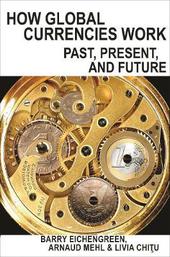
|
How Global Currencies Work: Past, Present, and Future
Paperback / softback
Main Details
| Title |
How Global Currencies Work: Past, Present, and Future
|
| Authors and Contributors |
By (author) Barry Eichengreen
|
|
By (author) Arnaud Mehl
|
|
By (author) Livia Chitu
|
| Physical Properties |
| Format:Paperback / softback | | Pages:272 | | Dimensions(mm): Height 235,Width 156 |
|
| Category/Genre | International finance
International trade
Economic history |
|---|
| ISBN/Barcode |
9780691191867
|
| Classifications | Dewey:332.042 |
|---|
| Audience | | Tertiary Education (US: College) | | Professional & Vocational | |
|---|
| Illustrations |
38 b/w illus. 18 tables.
|
|
Publishing Details |
| Publisher |
Princeton University Press
|
| Imprint |
Princeton University Press
|
| Publication Date |
26 February 2019 |
| Publication Country |
United States
|
Description
A powerful new understanding of global currency trends, including the rise of the Chinese yuan At first glance, the history of the modern global economy seems to support the long-held view that the currency of the world's leading power invariably dominates international trade and finance. But in How Global Currencies Work, three noted economists
Author Biography
Barry Eichengreen is the George C. Pardee and Helen N. Pardee Professor of Economics and Political Science at the University of California, Berkeley. Arnaud Mehl is principal economist at the European Central Bank. Livia Chitu is an economist at the European Central Bank.
Reviews"An ambitious title that delivers fascinating analysis on the rise and fall of international currencies in the 20th century with some educated suggestions about their trajectories in the 21st."-Christopher Smart, Project Syndicate "An excellent introduction to the history of international reserve currencies over the past two centuries. . . . [C]ompulsory reading."-Richard Parlour, Central Banking Journal "This eloquent and learned book will become the standard-perhaps one should say the gold standard-for discussions of international currency regimes, and for the analysis of the uncertainties that accompany changing global leadership."-Harold James, Princeton University
|